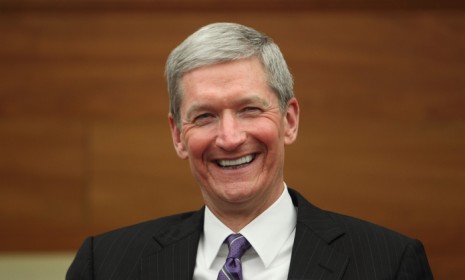Four ways Apple has changed under Tim Cook
The operations maestro is stepping out from under Steve Jobs' shadow and leaving his own mark — and some insiders are thrilled

A new Fortune cover story takes a look at current Apple CEO Tim Cook, who isn't, as many have pointed out, his predecessor Steve Jobs. When the two execs' careers overlapped, many viewed the level-headed operations chief Cook as the calm yin to the Jobs' famously brash yang. Yet, when Cook took over after Jobs' 2011 death, some worried that his cool approach wouldn't be enough to maintain Apple's momentum. How is Cook's leadership style changing the world's most valuable company? Here, four ways Apple is already different, for better or worse:
1. Cook is willing to release less-than-perfect product
The ultimate "tell" of Cooks' leadership at Apple will be product quality, says Fortune's Adam Lashinsky, whose revealing book, Inside Apple, was published earlier this year. And watchers looking for "deficiencies" are pointing their fingers squarely at Siri, "a less-than-perfect product released with the rare beta label in late 2011." The personal digital assistant has frustrated users with its slow response times and an inability to comprehend many users' questions. Releasing buggy iPhone software wouldn't have flown under Jobs' leadership, say former insiders. "People are embarrassed by Siri," says one. "Steve would have lost his mind."
The Week
Escape your echo chamber. Get the facts behind the news, plus analysis from multiple perspectives.

Sign up for The Week's Free Newsletters
From our morning news briefing to a weekly Good News Newsletter, get the best of The Week delivered directly to your inbox.
From our morning news briefing to a weekly Good News Newsletter, get the best of The Week delivered directly to your inbox.
2. Wall Street loves him
Apple's stock has been skyrocketing ever since Cook took over as permanent CEO in August 2011. Cook has already issued a dividend and has demonstrated a clear willingness to communicate with Wall Street. By contrast, Steve Jobs "always loathed investors and the stock market," says Jeffrey Van Camp at Digital Trends. "It's a subtle but significant change," says Lashinsky. "Investors now have the CEO's ear for the first time in years."
3. Values are shifting
Cook is a "master of operational efficiency," having streamlined Apple's badly broken supply chain when he joined the company in 1998, says Lashinsky. But as COO, Cook's contributions "flew so far under the radar that he was practically invisible outside the company," allowing Apple's marketing and product design teams to soak up all the praise. Now? "He's brought in a lot of MBA-toting new employees to Apple," says Erica Ogg at GigaOm. Some are starting to wonder if operational efficiency is becoming "more of a priority compared to engineering creativity." As a result, Apple has a more corporate feel to it overall. Says one former engineer: "It looks like it has become a more conservative execution engine rather than a pushing-the-envelope engineering engine."
A free daily email with the biggest news stories of the day – and the best features from TheWeek.com
4. The atmosphere is more relaxed
During the Jobs era, employees were keenly aware of their impulsive boss' polarizing mood swings. Under Cook, the company's culture is more easy going — a reflection of the new chief's even temperament. A recent executive retreat, for example, was described as "upbeat and even fun," says Lashinksy. Cook himself was "in a jovial, joke-cracking mood — a stark contrast to the grim and fearful tone Jobs engendered at the meetings." Cook is clearly leading in his own way, says GigaOm's Ogg. Investors are generally happy, and life as an Apple employee "sounds a little less terrifying." But it's still too early to tell if Cook's stamp on company culture will do what many fear: "Transform Apple into an ordinary company."
-
 Must-see bookshops around the UK
Must-see bookshops around the UKThe Week Recommends Lose yourself in beautiful surroundings, whiling away the hours looking for a good book
-
 A Nipah virus outbreak in India has brought back Covid-era surveillance
A Nipah virus outbreak in India has brought back Covid-era surveillanceUnder the radar The disease can spread through animals and humans
-
 Nasa’s new dark matter map
Nasa’s new dark matter mapUnder the Radar High-resolution images may help scientists understand the ‘gravitational scaffolding into which everything else falls and is built into galaxies’